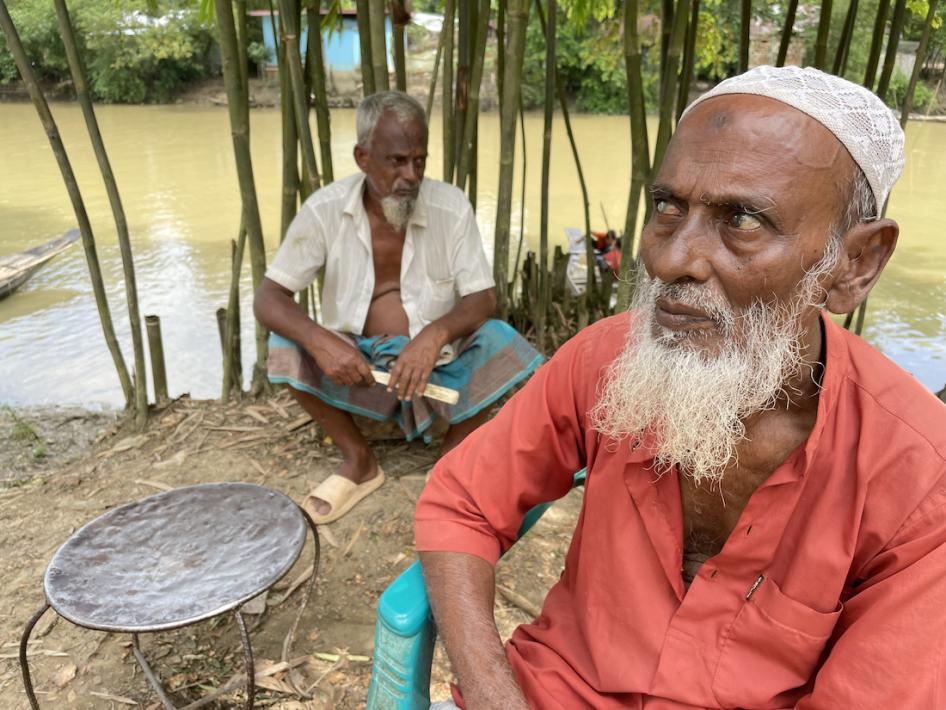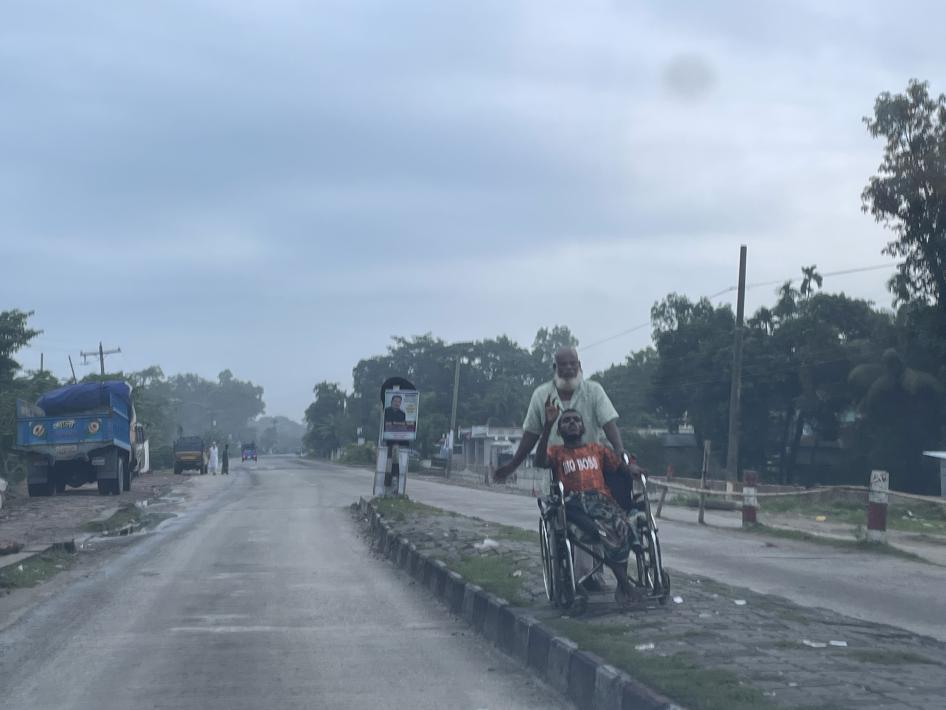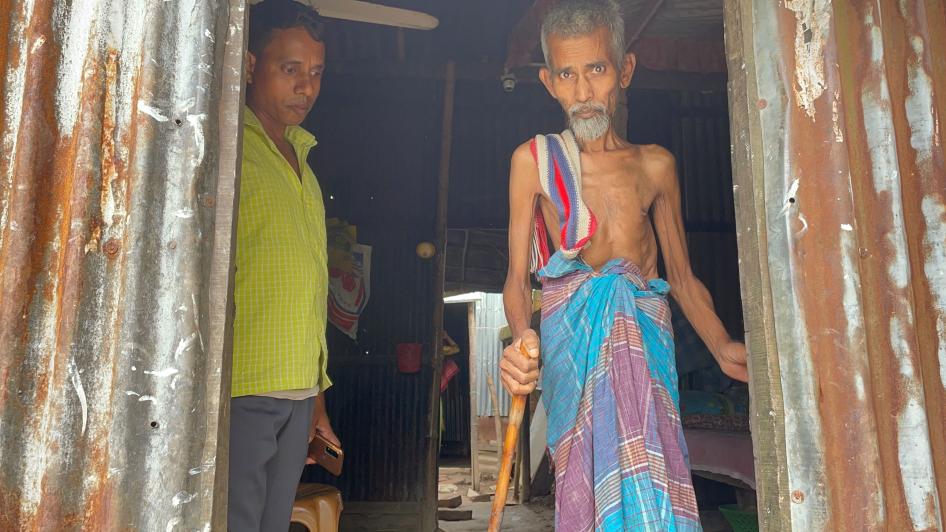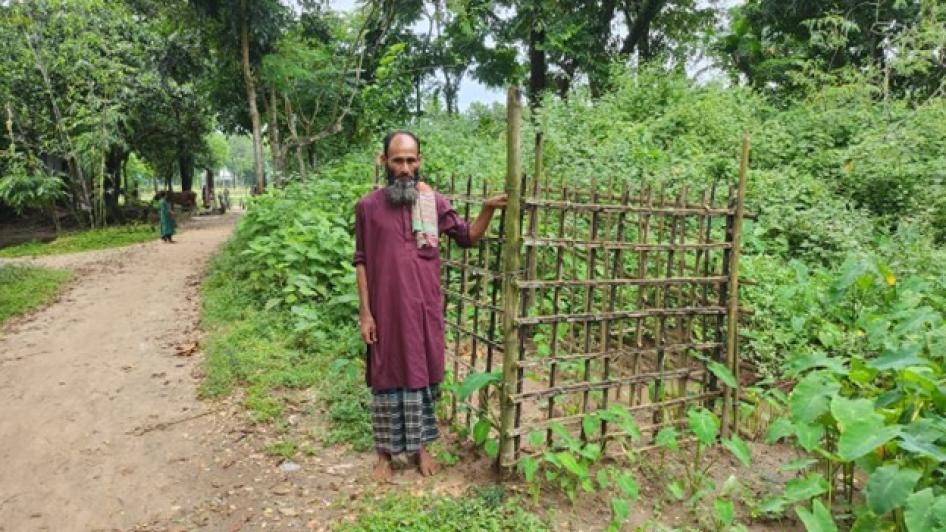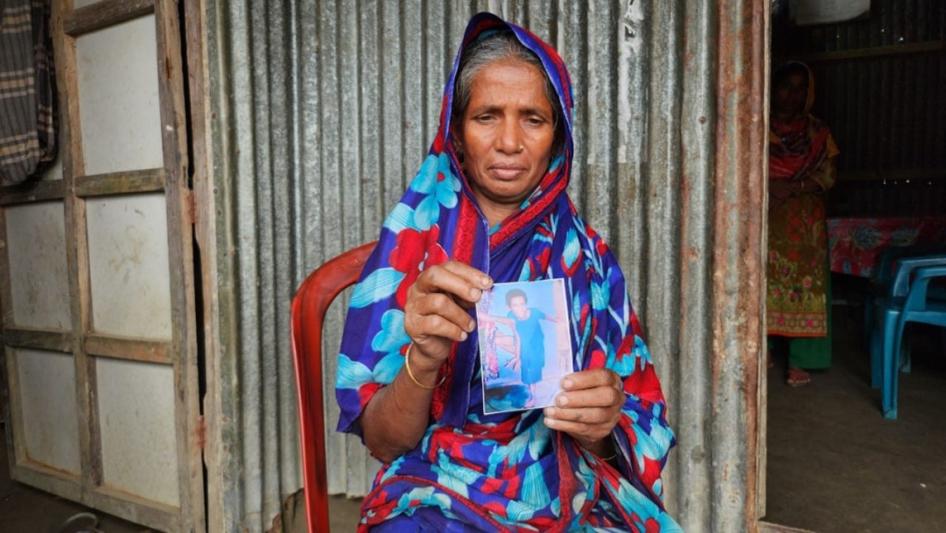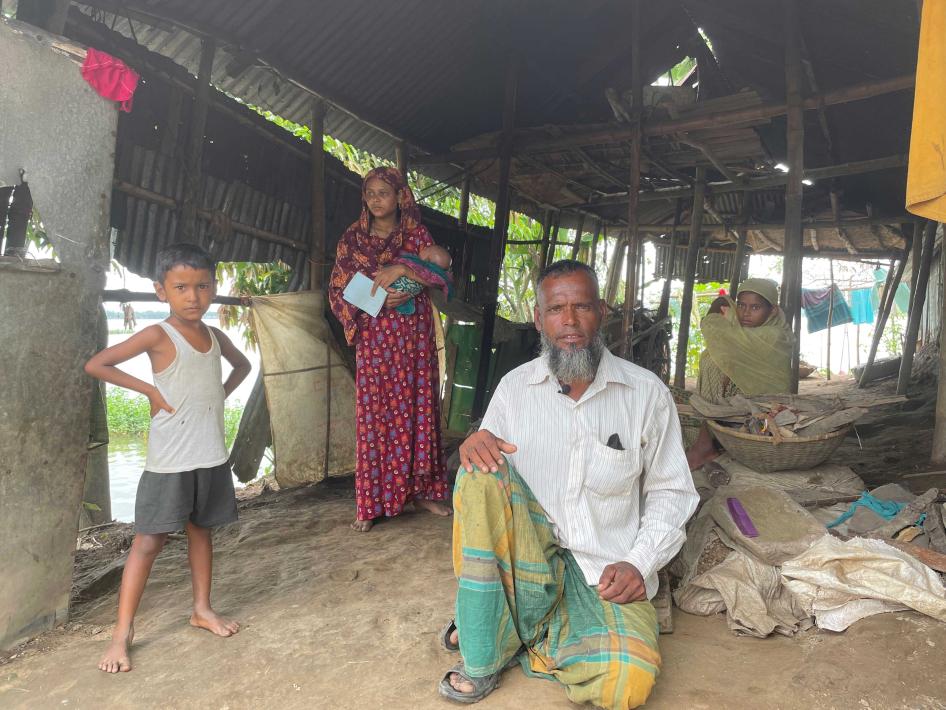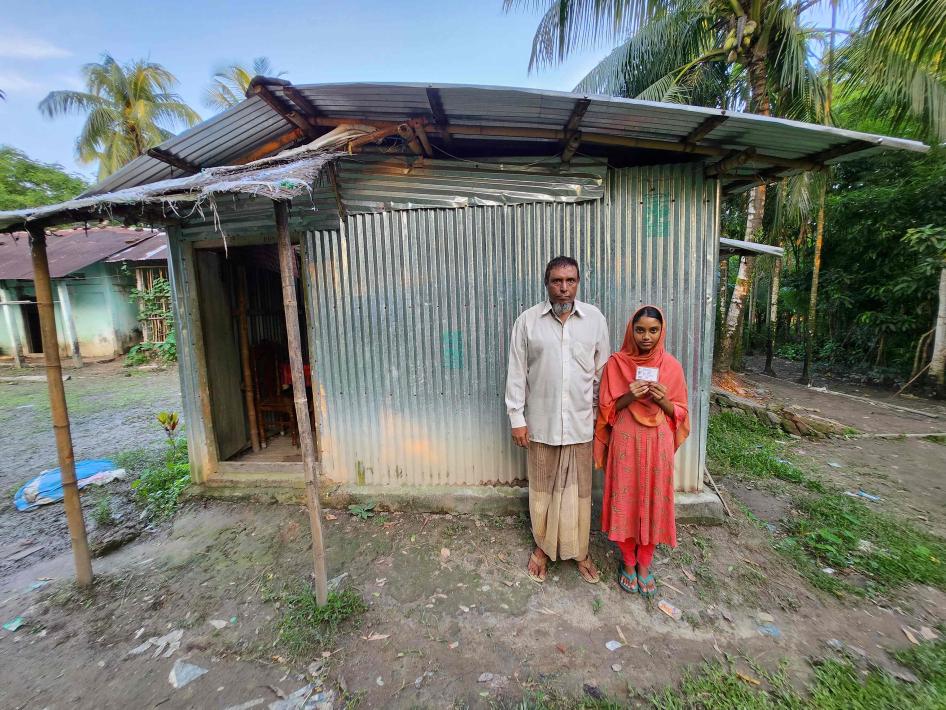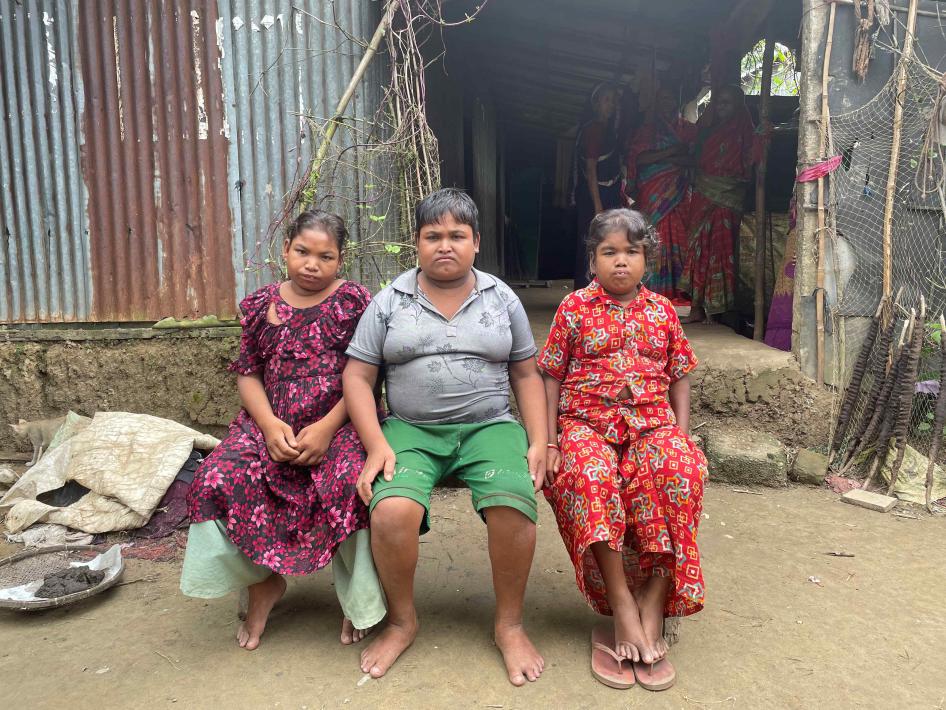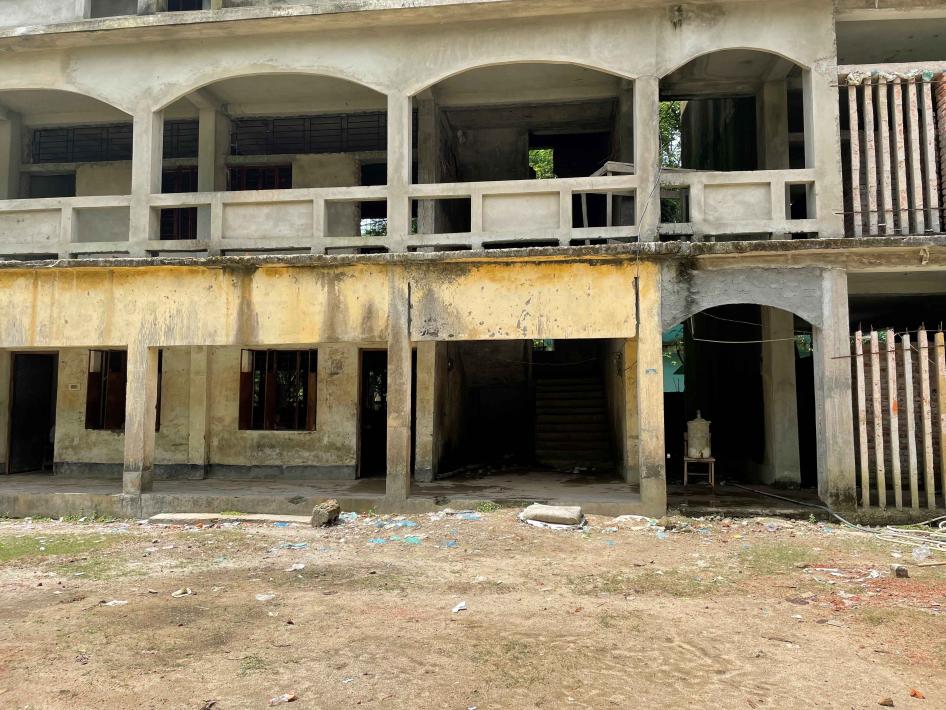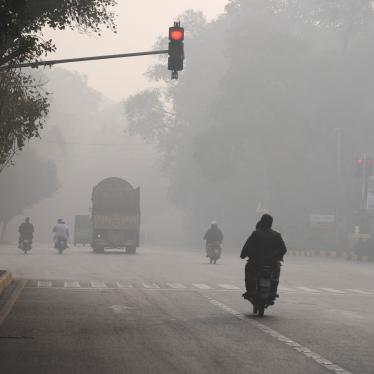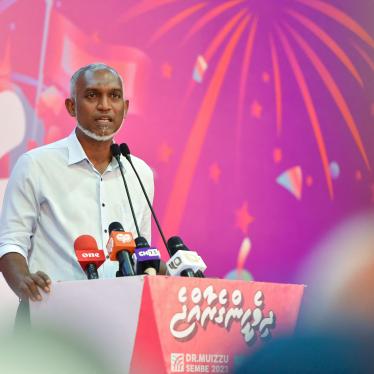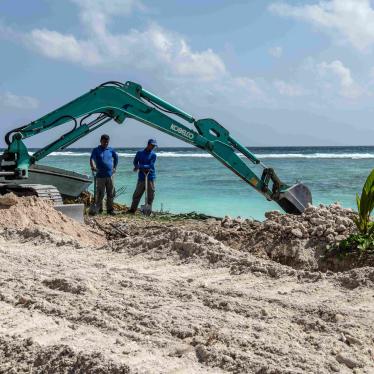(New York) – Unprecedented flooding during the monsoon season in northern Bangladesh in June 2022 caused loss of lives and livelihoods, extreme hardship, threatening the human rights of at-risk populations, Human Rights Watch said today. As the monsoon season approaches, Bangladeshi authorities should ensure that people with disabilities and older people living in flood-prone regions are protected through improved access to services and infrastructure.
Severe flash floods in northeastern Bangladesh between June 15 and June 28, 2022 killed at least 141 people, according to government data, and left millions in desperate need of shelter and aid, including people with disabilities and older people, who often face disproportionate difficulties in surviving extreme weather events due to inaccessible services, neglect, and lack of targeted action. Extreme weather events are expected to become more frequent and intense because of climate change.
“After witnessing the devastating effects of last year’s floods, especially on people with disabilities and older people, the authorities in Bangladesh should act urgently to prevent a repeat occurrence,” said Emina Ćerimović, senior disability rights researcher at Human Rights Watch. “The devastation highlights the urgent need to ensure inclusive disaster response and climate action planning, as climate change will further exacerbate the inequalities that people with disabilities and older people already face, including staying safe in situations of risks.”
Between August and September 2022, Human Rights Watch interviewed 38 survivors of the floods in Sylhet and Sunamaganj, two districts that were particularly affected. Human Rights Watch also conducted 24 online video interviews between August 2022 and May 2023 with disability rights organizations, climate change experts, local officials, and aid agencies.
Human Rights Watch found that the authorities had failed to deliver early warnings and adequate assistance with evacuation, shelter, health care, food, drinking water, sanitation, and hygiene, particularly to older people and people with disabilities. Most of those interviewed said they had no support from the government to reach safety and to access essential services, such as shelter, health care, and food assistance.
Since Bangladesh gained independence in 1971, successive governments have developed extensive disaster mitigation and response systems, which have significantly reduced casualties during flooding. It has committed to include people with disabilities and older people in disaster response policies, and most recently in the national climate change adaptation plan.
However, Human Rights Watch found that these efforts did not translate into practice during the June 2022 floods, leaving older people and people with disabilities unprotected and unable to access basic services, which placed their lives at risk. Abdul Kadir, 67, from Tahirpur, Sunamganj, said he had to rely on his son for food and water: “During the flood it was like we were in hell. My son went swimming or wading in the water to collect aid when he heard of anything.”
There is no official data on flood-related deaths of older people and those with disabilities, but interviewees said that at least one older person and five people with disabilities died in Sunamganj, including two children, because of the flooding or in its aftermath. Taslima Begum, a 20-year-old woman with an intellectual disability, died in her home in Bishwamvarpur, Sunamganj, on June 27, 2022, 10 days after falling into a flooded toilet pit.
Part of the problem in the 2022 floods was that the response system was inadequate for the unprecedented level and swiftness of the flooding. None of the interviewees received any advanced warnings of the floods. Habibur Rahman, from Bishwanath, Sylhet, whose 80-year-old mother died during the flooding as she did not have access to medications she used regularly, believes an advanced warning could have saved his mother’s life.
Only seven people with disabilities and older people interviewed reached a shelter but found crowded and damp conditions and experienced difficulties accessing sanitation facilities. Delowar Hossain, a 42-year-old man with a physical disability, said he had to crawl to reach a toilet while sheltering at a local school.
Access to food was a major problem for all interviewees. Local municipal representatives confirmed that the food assistance they received from the government was insufficient.
Everyone interviewed said the flooding significantly affected their mental health, with many describing extreme fear, anxiety, and distress, but none had access to psychosocial services.
Economic and social factors determine a person’s ability to adapt to climate change and stay safe during extreme weather events. Everyone interviewed was burdened by poverty before the flooding and the losses they experienced during the flooding exacerbated the difficulties they previously faced.
The government of Bangladesh should urgently meet its human rights obligations to respond to the foreseeable harms of climate change and ensure protection of people with disabilities, older people, and other at-risk groups, including by carrying out its existing policies. It should act on its commitments under the National Plan for Disaster Management 2021-2025 and the Climate Change National Adaptation Plan 2023-2050 by ensuring that older people and people with disabilities are meaningfully included in disaster response and adaptation.
Governments historically responsible for climate change should support climate-vulnerable countries like Bangladesh to deal with extreme weather events, including by investing in immediate response and climate change adaptation – a process of adjusting to current and future effects of climate change, and by phasing out fossil fuels that are driving the climate crisis, Human Rights Watch said.
Under article 32 of the Convention on the Rights of Persons with Disabilities, state parties should ensure that all international cooperation, including international development programs, is inclusive of, and accessible to, people with disabilities. The treaty expressly recognizes that international cooperation supports national efforts to effectively implement states parties’ obligations, which include article 11 on protection and safety during disasters.
“While climate change and extreme weather events affect everyone, people with disabilities and older people, who already face marginalization and discrimination, are often left to cope with the danger on their own,” Ćerimović said. “International partners should urgently provide technical and financial support to Bangladesh to ensure those most at risk are included and supported to adapt to climate change.”
Climate Change Impacts and Weather Extremes in Bangladesh
While no conclusive evidence currently attributes the 2022 floods in Bangladesh to the climate crisis, the Intergovernmental Panel on Climate Change has noted an increase in daily precipitation over most of South Asia. The panel also projects a further rise of temperatures in South Asia as a result of climate change, increasing risk of extreme flooding particularly during the monsoon season.
Bangladesh contributes only 0.56 percent of global greenhouse gas emissions, yet it is among the most vulnerable countries to the effects of climate change. Bangladesh’s Adaptation Plan includes strong commitments to include people with disabilities and older people, but the government estimates that it will cost $230 billion to carry out. Bangladesh has identified difficulties in accessing international financial support as one of its major implementation challenges.
Methodology
Human Rights Watch interviewed 36 people affected by the floods in Sylhet and Sunamagaj districts between August 11 and September 30, 2022, including 14 adults and a girl with a disability, 2 older men, and 19 relatives of older people and people with disabilities. Human Rights Watch also interviewed representatives of five local organizations of people with disabilities and two environmental groups, seven local government representatives, representatives of three international humanitarian organizations, two United Nations agencies, and three climate scientists between July 2022 and May 2023.
In January 2023, Human Rights Watch sent a formal letter to Enamur Rahman, disaster management and relief minister, requesting a meeting, and another meeting request in April 2023 to the Department of Disaster Management under the Ministry of Disaster Management and Relief but received no response despite repeated follow-ups.
Deaths
Human Rights Watch interviewed family members of five people with disabilities and one older person who died because they could not get medical care or faced deadly risks when trying to reach a toilet during the flooding or in its aftermath in Sunamganj.
Taslima Begum, a 20-year-old woman with an intellectual disability, fell into a flooded toilet pit near her home in Bishwamvarpur, Sunamganj. Her father, Mohammad Montaz Ali, managed to pull her out but could not find a boat that would take Taslima to an ambulance. Her condition worsened and she died ten days later. The family had to keep her body for a few days on the bed inside their house, waiting for the water to recede: “We were four people stuck inside, along with my deceased daughter. Later, we buried her in the local graveyard.”
Shamsun Nahar, a 12-year-old girl in Jamalganj, Sunamganj, who had cerebral palsy, developed fever and died around June 20 after spending four days in waist deep water. Shamsun’s mother, Fatema, said: “My daughter was not able to move at all and so we could not even consider leaving for the shelter. We were stuck inside the house [and] we could not contact a doctor due to the flood.” The family was also not able to properly bury her. “We dug a hole in soil that filled with water, and we just buried her.”
Suraiya Begum, a 9-year-old girl with a physical disability who lived in Jamalganj, Sunamganj, also developed fever after almost drowning in the water in her flooded house and died a week later. “I could not give her any medicine because there was water everywhere, and managing a boat was a nightmare,” said Morzina Akhter, Suraiya’s mother. “We were stranded inside the house as no one came to rescue us. The government did nothing to help us.”
Royis Miah, 21, who had intellectual and physical disabilities, drowned near his house in Tahirpur, Sunamganj, while attempting to use the temporary outside toilet. His father, Mohammad Waris, said:
Typically, we helped Royis when he needed to use the toilet, but that day he tried to use it on his own and fell into the water. My wife and I were at another side of house, so we did not notice. When we came back to find our son, it was too late.… it was not deep, but because he had a disability, he was not able to save himself.”
Mental Health
Academic and medical research indicates that climate change and extreme weather events increase the risk of negative mental health impacts. According to one study, the prevalence of mental health conditions, such as depression and anxiety, in Bangladesh increased after climate-induced disasters, such as flooding. The study also found that people with physical disabilities are at higher risk than others of adverse mental health impacts.
Nurul Islam from Bishwanath, Sylhet, said that his 15-year-old daughter, Nilima, who has a hearing and speech disability, was terrified by the rising water: “My daughter cannot talk so it’s difficult for her to express how she felt, but she was holding tight to us every night until the morning for days. We understood that she was terrified.”
The father of Mosaddek Hossan, 23, from Bishwanath, Sylhet, who has multiple disabilities, including speech difficulties, said that his son “was so terrified of the water that he was shouting ‘Allahu, Allahu,’ calling out to God.”
When Human Rights Watch asked Ripa Rani Das, an 18-year-old woman with physical and intellectual disabilities living in a rural area of Biswamvarpur, Sunamganj about the flooding, she started crying, remembering how she injured herself by falling into the water.
Families of people with disabilities and older people who died are left dealing with grief and the trauma of loss without adequate mental health support. Mohammed Ali said: “Since my daughter died, I cannot sleep properly at night. I keep dreaming about her.… If I had been able to help her, perhaps I could sleep peacefully at night.”
Bangladesh’s National Mental Health Strategic Plan 2020-2030 recognizes that “people with disabilities are more likely to experience barriers to accessing health care, including mental health care,” and commits to providing psychosocial support to survivors of disaster. The National Plan for Disaster Management 2021-2025 also includes efforts to provide psychosocial support, but none of the 36 people interviewed or their family members received assistance.
Economic Impacts
According to Bangladesh’s Climate Finance For Sustainable Development Budget report, the country spent nearly US$3 billion in 2021-2022 – about seven percent of the annual budget – on climate change-related disaster response measures. But this amount pales in comparison with the economic cost of climate-related events. According to the World Bank, tropical cyclones alone cost Bangladesh on average $1 billion annually. The World Bank estimates that a severe flood could reduce Bangladesh’s GDP by up to nine percent annually.
The June 2022 floods damaged over $12.5 million of crops, affecting an estimated 24,000 farmers. More than 106,000 drinking water points were reportedly damaged, leaving people without drinking water and at risk of developing life-threatening waterborne diseases.
Many people with disabilities and older people experienced significant financial harm, with houses destroyed or damaged, livestock washed away, and personal belongings lost. Delowar Hossain, a 42-year-old man with a physical disability from Tahirpur, Sunamganj, said: “When we returned to our house [from the shelter], we found that nothing was left, everything was washed away, including our furniture and food.” Mohammed Abdul Gani, 75, from Bishwanath, Sylhet said: “When we returned from that shelter [a nearby primary school] after 12 days, we lost so many valuables from my house. Either they were washed away, or we had been robbed.” None of the people interviewed had received any government assistance for the losses they endured.
The flooding damaged an assistive brace belonging to Tahmin Begum, a 15-year-old girl with a physical disability in Dakshin Surma, Sylhet. “Without shoes, Tahmin has to crawl,” her mother said. According to Humanity and Inclusion, one of the few international organizations providing support to people with disabilities, many people lost their assistive devices during the flooding.
People interviewed said that these losses only increased their poverty. They all lived in homes made of thatch or tin roof with mud walls and floors, which are vulnerable during extreme weather events. All said they were unable to get jobs and depended on family members or charity to provide for them. Only five people received a government disability allowance but at irregular intervals.
In Bangladesh, 54 percent of people with disabilities are unemployed compared with 34 percent of people without disabilities; this percentage is even higher for women with disabilities, 95 percent of whom are unemployed.
Hasena Begum, 25, has a physical disability and used to beg at the bazaar in Tahirpur, Sunamganj, to provide for her family, including three younger siblings with disabilities. Hasena’s mother, Anowara Begum, said that due to the flooding, Hasena has been unable to beg, and the family had to take a high-interest loan from neighbors to support themselves. Two other people reported taking such loans to afford basic necessities.
Bangladesh Government Response
The National Adaptation Plan 2023-2050, adopted in October 2022, recognizes that older people and people with disabilities face disproportionate risk and that climate action has overlooked their specific needs. The plan prioritizes disability and age inclusive response and adaptation – the process of adjusting to current or expected effects of climate change, and commits to empowering older people and people with disabilities to participate in locally-led measures.
Experts and those affected by the floods interviewed said that there is a disconnect between inclusive language in policies and reality. Vashkar Bhattacharjee, inclusion advisor at Young Power in Social Action, a nonprofit organization for sustainable development, and an expert in inclusive disaster management and climate change, said, “Even though we have nice laws and policies for disaster management and climate change, when it comes to practice, it’s not translating into inclusive action.”
A representative of Humanity and Inclusion, one of the few international organizations focused on providing support to people with disabilities, said that people with disabilities are generally left behind, and that humanitarian organizations were not able to fully assist people in “hard to reach” and remote areas during the 2022 floods. Borja Gopal Saha, a representative of Centre for Disability in Development, a leading disability rights and climate change organization in Bangladesh highlighted a need for more training, sensitization, and empowerment of local organizations of people with disabilities.
Failure of Early Warning Systems
Bangladesh has improved its early warning systems, but government officials did not anticipate the severity of the June 2022 floods. None of the people interviewed received warnings, leaving many to be unprepared and wondering whether to stock up on food and medicine, or to move to safe areas. Mohammad Sher Uddin, a 50-year-old man with a physical disability, from Bishwanath, said:
We were not prepared because we did not receive any warnings. Even in the afternoon [on the first day] when we saw roads flooded, no one said it could be dangerous. But, that night, the water started entering our homes. Now we need a better plan from the government for people with disabilities like me, so that we are able to better cope next time.
Abdul Karim, 65, from Bishwanath, Sylhet, said that he and others could have taken steps to protect themselves if they had received advanced warning. “If there was a prior warning, we could have gone to relatives whose houses were on higher grounds and were not flooded.”
Habibur Rahman, from Bishwanath, Sylhet, whose 80-year-old mother died during the flooding since she did not have access to the medication she used regularly, said an advanced warning would have made a difference: “If only we had been warned that the whole Sylhet would be flooded, we could have at least stocked up on food and [my] mother’s medication.”
Inadequate and Inaccessible Shelters
Those interviewed said that they were not aware of any official announcement about shelters and that most of them simply went to the nearby school knowing that it was the only multi-story building in the village.
Shelters are a key component of Bangladesh’s disaster response system. One study found that Bangladesh’s national disaster shelter program has reduced cyclone fatalities by 75 percent. However, these shelters are primarily located along the coast where cyclones are more common. According to local representatives, there are no dedicated shelters for flooding in Sylhet and Sunamaganj. Instead, when the flooding occurred in 2022, the government ordered local officials to use existing schools and religious schools.
People with disabilities and older people said that makeshift shelters during the 2022 floods were crowded and without any food, toilets, and proper sleeping areas. The shelters were not accessible to people with disabilities, especially the toilets. Mohammad Abdul Gani, 75, described the conditions in the shelter as “another nightmare”:
There were only two toilets used by 200 to 300 people. As I have cataracts, I cannot see properly, so it was also difficult for me to move around the shelter. My son helped me when he was around, but he had to go and look for food.
Rina Begum, in Sylhet district, who was caring for her 80-year-old father-in-law and a 4-year-old daughter with disability, said they could not remain in the nearby school where about 100 families were sheltering:
We could not stay there for more than four days, because it was difficult for me to look after my father-in-law and my daughter. Lots of people were using the same toilet, the floor where we were sleeping was wet and dirty, and there was food scarcity. We got a hot meal only once in the four days we were there.
A representative of Humanity and Inclusion said that many families of people with disabilities may have decided to stay home rather than to go to an inaccessible shelter. Bina Rani Talukder, vice chairman of the subdistrict from Jamalganj, Sunamganj, said she visited families who had stayed at their houses during the flooding and that she found many people with disabilities. “They found it difficult to move a family member with a disability, so they decided to stay in their damaged houses instead of going to a shelter.”
Failure of Humanitarian Assistance
Local municipal representatives confirmed that the government’s food assistance fell short. Soyful Haque, a local representative from Bishwanath Sadar Union Parisad in Sylhet who managed six shelters, said that they had to depend on private charities and individual donations.
Rajat Kanti Das, a local representative of seven affected villages in Bishwamvarpur, Sunamaganj, said the government’s response was inadequate, with only 1,500 kilograms of rice, which was not enough for the approximately 1,000 households affected.
Aklima Akhter, an elected representative from Bishwamvarpur, Sunamaganj said that the shelter in her area operated for 15 days, but after that, the funds dried up: “People with disabilities in my locality are in need of financial assistance to rebuild their homes, to afford food and drinking water.”
While everyone affected struggled to get drinking water and food, people with disabilities and older people faced greater problems as they could not reach these vital supplies by themselves.
Mohammad Sher Uddin, a 50-year-old man with a physical disability, from Bishwanath, Sylhet, said he was unable to walk seven kilometers to the nearest market to buy food.
Begum, 45, from Sadar, Sunamganj, said her 65-year-old mother, Nurunnesa, suffered due to food shortages: “Even at the shelter, we ran out of food. For five days we survived just on water.” She said that an individual donated some dry food to the shelter, but aid was generally inconsistent and limited. “Three times we heard that there was government relief being distributed so we rushed to that place and tried to get some food. Two times I received [rations], another time I returned empty handed. Children, older people were crying for food. We thought we would die.”
Habibur Rahman, father of a 15-year-old girl with cerebral palsy and son of an 80-year-old woman, who lived with his family in Bishwanath, Sylhet said obtaining food was difficult:
We did not have food until we heard from a neighbor that an individual donor was distributing some food ration in the bazaar. I rushed there and got some rice, oil, sugar, salt, and daal [lentil soup]. That was after four days. For the first four days, we were kind of starving. We had some stored puffed rice and some biscuits.
Nurul Islam, with a family of eight including a 15-year-old with a disability, said local authorities in Bishwanath, Sylhet, provided aid only once, which included a kilogram of rice, soybean oil, sugar, two packets of salt, and a packet of puffed rice. “That was not enough for my family members. It was just something to survive on.”
Only one family interviewed said they were evacuated from their home by the army, while the rest either were trapped, moved on their own, or were rescued by neighbors. “The Sylhet flood has also exposed our weakness in search and rescue preparedness,” Enamur Rahman, minister for disaster management, was reported by media to have said.
Habibur Rahman said his family relied on their neighbors to help them reach safety:
While we were stuck at our house that night when it was flooded, I saw military boats passing along the river next to our house, and I was shouting for them to come and rescue us, but they could not hear us. The next morning, our neighbors helped us evacuate. They brought a big cooking pot. I put my daughter with a disability in one and my older mother in another, and then I pulled them through the water to a nearby house to take shelter.
Failures to Collect Disaggregated Data
Since there is no disaggregated data, authorities could not identify how many people with disabilities were affected by the June 2022 floods, to ensure delivery of resources. A representative of a UN agency said: “In terms of disability, most of our implementing partners and the government make estimates. Only if the disability is clearly visible – these people may be counted.”
Recommendations
To the government of Bangladesh
- Ensure that emergency messaging methods, emergency preparedness, response, and recovery programs are inclusive of, and accessible to, everyone and developed in consultations with people with all types of disabilities and older people, and in particular those in rural and hard to reach areas.
- Ensure that evacuation, shelters, health care services, including mental health care, and food distribution efforts include people with disabilities and older people.
- Ensure meaningful inclusion of people with diverse disabilities and older people in all future climate change discussions and decision making at all levels of government, including on mitigation, adaptation, and preparedness planning.
- Adopt new design guidelines for accessible cyclone and flooding shelters, as described in the National Adaptation Plan, and replicate them in other shelters. People with disabilities should be consulted with and involved in the development of design guidelines.
- Create a voluntary registry for people at particular risk and develop systems to inform and support people with disabilities and older people when adapting to extreme weather events linked to climate change, in consultation with these groups.
- Investigate the impact of extreme weather events on at-risk populations, including by collecting data disaggregated by age, disability, and gender, among other relevant categories.
- Provide targeted rehabilitation services and psychosocial support to people with disabilities, older people, and their families who have been affected by flooding and other weather extreme events.
- Provide regular training, designed in consultations with people with disabilities and older people, to first responders on the rights and needs of people with disabilities and older people, including communication needs.
- Establish an independent mechanism to monitor the implementation of the National Adaptation Plan, in particular commitments and actions prescribed to ensure safety of people with disabilities and older people and ensure that shortcomings are addressed promptly. The mechanism should work closely with people with disabilities, older people, and other at-risk groups, in particular those with lived experience, to ensure their views are heard and taken into account.
- Address the root causes of poverty faced by people with disabilities in Bangladesh and ensure access to social protection.
To Bangladesh’s international partners
- Address extreme weather events linked to climate change by both supporting Bangladesh to deal with the foreseeable harm of extreme weather events, including by investing in the implementation of adaptation planning, addressing the harms already experienced by at-risk populations, and reducing the global greenhouse gas emissions that are driving the climate crisis.
- Help Bangladesh support those populations most at risk of extreme weather events including through climate resilient and sustainable housing infrastructure, food assistance, and improving early warning systems, evacuations, and shelters.
- Ensure that all efforts and other international development programs include people with disabilities and older people, particularly those with experience of extreme weather events.
- Strengthen the capacities of organizations of people with disabilities and older people, including through training and funding, to actively participate in all disaster risk reductions and response activities as well as climate change adaptation and mitigation efforts.
To humanitarian organizations and UN agencies
- Ensure that all humanitarian and development programs are inclusive in design and planning.
- Provide targeted funding and outreach to older people and people with disabilities to ensure protection and safety during extreme weather events, and the ability to adapt to climate change.
- Identify challenges and develop solutions to address existing gaps in collecting reliable data on people with disabilities and older people.
